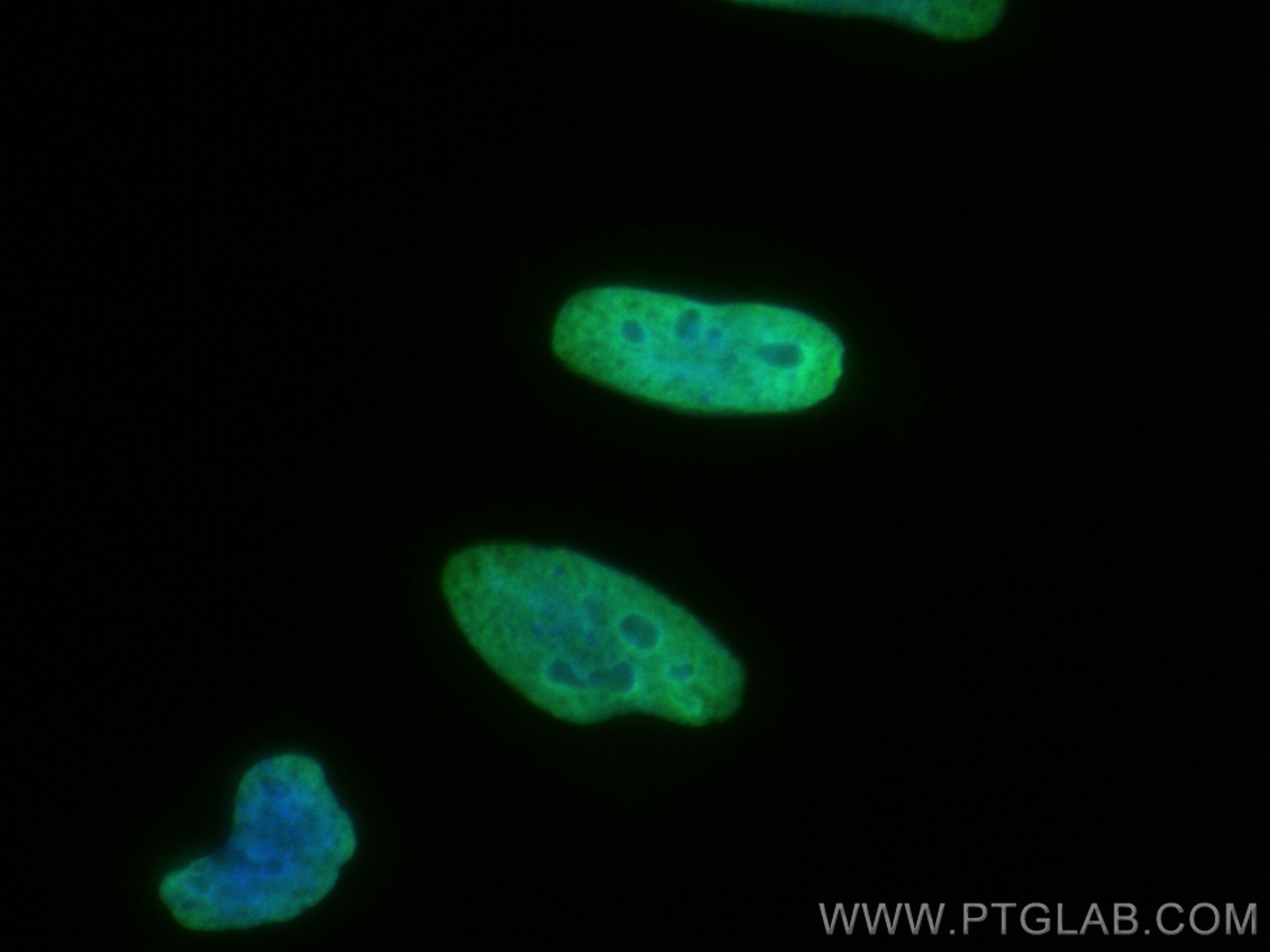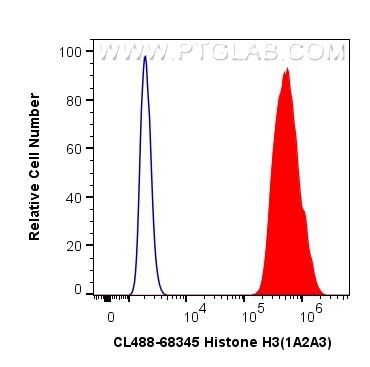Anticorps Monoclonal anti-Histone H3
Histone H3 Monoclonal Antibody for FC (Intra), IF
Hôte / Isotype
Mouse / IgG2b
Réactivité testée
Humain, poisson-zèbre, poulet, rat, souris, wheat
Applications
IF, FC (Intra)
Conjugaison
CoraLite® Plus 488 Fluorescent Dye
CloneNo.
1A2A3
N° de cat : CL488-68345
Synonymes
Galerie de données de validation
Applications testées
| Résultats positifs en IF | cellules HeLa, |
| Résultats positifs en cytométrie | cellules HepG2 |
Dilution recommandée
| Application | Dilution |
|---|---|
| Immunofluorescence (IF) | IF : 1:50-1:500 |
| Flow Cytometry (FC) | FC : 0.80 ug per 10^6 cells in a 100 µl suspension |
| It is recommended that this reagent should be titrated in each testing system to obtain optimal results. | |
| Sample-dependent, check data in validation data gallery | |
Informations sur le produit
CL488-68345 cible Histone H3 dans les applications de IF, FC (Intra) et montre une réactivité avec des échantillons Humain, poisson-zèbre, poulet, rat, souris, wheat
| Réactivité | Humain, poisson-zèbre, poulet, rat, souris, wheat |
| Hôte / Isotype | Mouse / IgG2b |
| Clonalité | Monoclonal |
| Type | Anticorps |
| Immunogène | Peptide |
| Nom complet | histone cluster 1, H3a |
| Poids moléculaire observé | 15 kDa |
| Numéro d’acquisition GenBank | BC066245 |
| Symbole du gène | HIST1H3A |
| Identification du gène (NCBI) | 8350 |
| Conjugaison | CoraLite® Plus 488 Fluorescent Dye |
| Excitation/Emission maxima wavelengths | 493 nm / 522 nm |
| Forme | Liquide |
| Méthode de purification | Purification par protéine A |
| Tampon de stockage | PBS avec glycérol à 50 %, Proclin300 à 0,05 % et BSA à 0,5 %, pH 7,3. |
| Conditions de stockage | Stocker à -20 °C. Éviter toute exposition à la lumière. Stable pendant un an après l'expédition. L'aliquotage n'est pas nécessaire pour le stockage à -20oC Les 20ul contiennent 0,1% de BSA. |
Informations générales
Histones are small, highly basic proteins that consist of a globular domain with unstructured N- and C-terminal tails protruding from the main structure. Histone H3 is one of the five main histones that are responsible for the nucleosome structure of the chromosomal fiber in eukaryotes. Two molecules of each of the four core histones (H2A, H2B, H3, and H4) form an octamer, around which approximately 146 bp of DNA is wrapped in repeating units, called nucleosomes. In addition to their role in DNA compartmentalization, histones also play crucial roles in various biologic processes, including gene expression and regulation, DNA repair, chromatin condensation, cell cycle progression, chromosome segregation, and apoptosis. The ability of histones to regulate chromatin dynamics primarily originates from various posttranslational modifications carried out by histone-modifying enzymes.
Protocole
| Product Specific Protocols | |
|---|---|
| IF protocol for CL Plus 488 Histone H3 antibody CL488-68345 | Download protocol |
| FC protocol for CL Plus 488 Histone H3 antibody CL488-68345 | Download protocol |
| Standard Protocols | |
|---|---|
| Click here to view our Standard Protocols |



